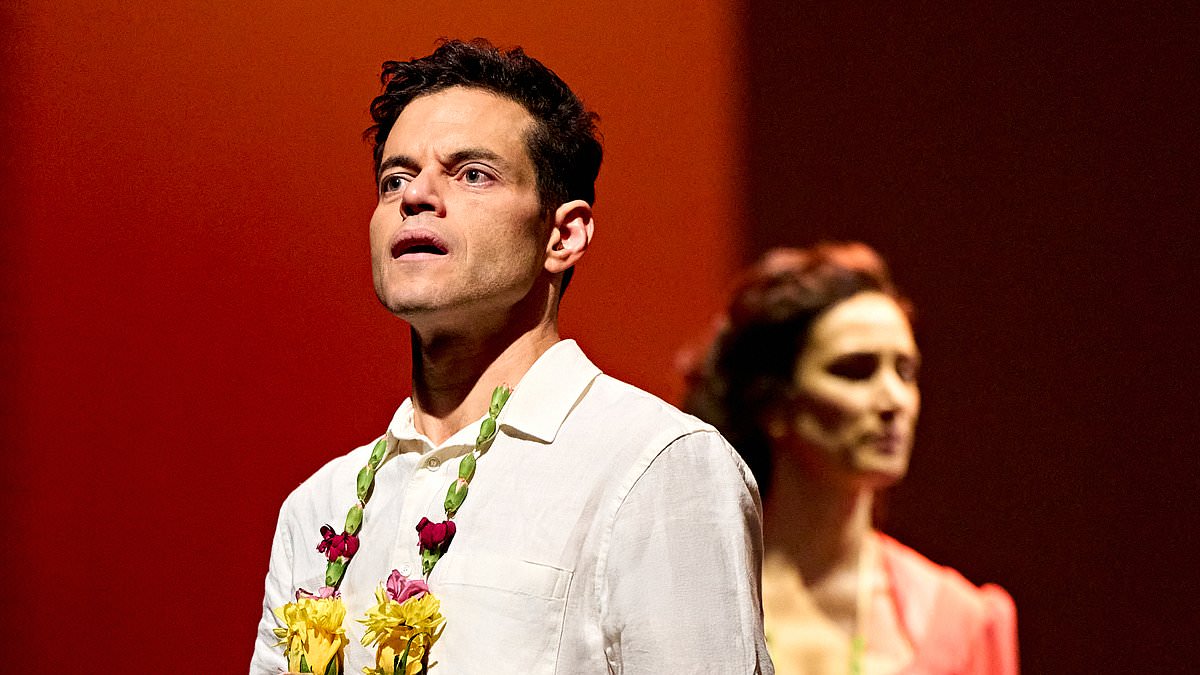Oedipus (Old Vic Theatre, London)
What oracle could have predicted that Freddie Mercury and Oedipus Rex might cross paths?
Yet that’s exactly what’s happening now at London’s Old Vic. The ancient King of Thebes, famed for slaying his father and marrying his mother, is being played by Rami Malek — who won an Oscar for playing the lead singer of Queen in the 2018 film Bohemian Rhapsody.
Sadly though, alongside Indira Varma as his unsuspecting mum, Malek isn’t the best thing about Matthew Warchus’s apocalyptic staging.

The ancient King of Thebes famed for slaying his father and marrying his mother is being played by Rami Malek (pictured)

Rami Malek and Indira Varma in Oedipus at the Old Vic Theatre on Tuesday
That accolade belongs to a gyrating chorus of dancers representing the desperate people of Thebes. Martialled by Israeli choreographer Hofesh Shechter, they lay on a narcotic display of flashing feet and flailing limbs, set to pounding drums that pin you to your seat and throb in your thorax.
Such is the unrest with which Malek has to contend as their remote and moody, Versace-clad monarch. Making his UK stage debut, he looks less like the marvellous Mercury, and more like tortured weirdo Lutsifyer Safin, from the Bond film No Time To Die.
His inscrutable, mask-like face makes a good fit for a great King from the Ancient World, but his inward looking method acting is not well suited to ritualistic staging that’s meant to evoke Greek religious cults from antiquity.
Accused by the Delphic Oracle (in the form of a clapped-out, reel-to-reel tape recorder), his best moments come when he learns he did indeed kill his father — and sire children by his mother. Then he squirms, like a jungle celebrity covered in lice.
Varma meanwhile sighs and rolls her eyes in despair at the foolish superstitions to which he yields.

What oracle could have predicted that Freddie Mercury and Oedipus Rex, might cross paths? Yet that’s exactly what’s happening now at London’s Old Vic, writes Patrick Marmion
And Ella Hickson’s wooden adaptation includes a bathetic line to her daughter, Antigone: ‘Come on, baba, I’ll read you a story’. Such pronouncements don’t belong in Sophocles. But Hickson also diminishes Oedipus’s tragedy by having Jocasta publicly undermine her husband-son’s status, before refusing to kill herself — an absurd twist in the name of ‘agency’ in a play that mocks such fantasies of control.
Even so, Warchus’s production and Rae Smith’s design is typically easy on the eye, with its cat-walk couture and alternation between Stygian gloom and the hazy orange light of a parched desert state. So, although it lacks the intellectual grit and psychological terror of Sophocles’ original, boy does that dancing give it some primal swagger.
